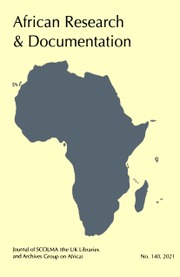No CrossRef data available.
Article contents
The Christopher Okigbo Collection: From Family Heritage to Public Archive
Published online by Cambridge University Press: 25 April 2022
Extract
This cyclical passage described by Christopher Okigbo in Elegy for Alto constitutes the core of the process of transmission that characterises the cycle of life, death and rebirth. After the poet's disappearance in 1967, the flame of his art and life still burns in our memories and outlives him through our committment to his legacy. Christopher Okigbo was born in 1932 in Ojoto, East Nigeria. The colonial context in which he was immersed at Government College, Umuahia shaped his work as much as the traditions of Igbo culture that were passed on to him by his maternal lineage.
- Type
- Research Article
- Information
- Copyright
- Copyright © International African Institute 2018




